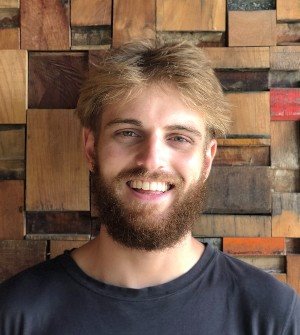
Harry Mills
With sustainability the focus – this Gottstein
Fellowship experience “was incredible.”
The purpose of the Gottstein Trust is to foster
opportunity and knowledge. Undoubtedly, it delivered in spades for 2019 Gottstein
fellowship recipient Harry Mills. “The experience of the Gottstein Fellowship
was incredible and has been immensely helpful for me,” he said.
“I encourage anyone with an idea to develop a
proposal and apply,” this young Queenslander said from his new workplace at the
University of Cambridge in the UK. An architectural designer and researcher
with a passion for environmental and climatic responsible design, Harry undertook
an international study with his Gottstein fellowship in conjunction with his
PhD research at the Future Timber Hub, Folded Structures Lab, and the School of
Civil Engineering at the University of Queensland.
He described the fellowship as “an international lens
to inform part of a larger project looking at product design and usage opportunities
for underutilised and marginalised timber for building products in Australia.” The
nub of his work is lifting recovery rates of timber across the building product
supply chain.
His study tour was directly relevant to the
Australian domestic timber industry, which is exactly what the Gottstein Trust wants
to encourage and support. Each year, the Trustees make available funding for
individuals to pursue ideas that develop their own skills and capabilities and
benefit the Australian industry.
Harry has encouraged people to back themselves in
and apply for any of the three categories of Gottstein Trust grants open for
applications. There is the category of skill development grants open for
application from anyone at any level in the industry – the amount
of funding sought is up to the individual to request according to the cost of
the skill development activity they have in mind. Also available is the
category of scholarships – these are to help students at TAFE or tertiary level
to pursue their studies and/or research. Finally, the well-known Gottstein
fellowship category is once again available in 2022. For this, the applicant
submits a project idea of their own creation which will usually require an
international or substantial domestic study tour and which can be shown to have
potential benefit for the Australian industry.
In a Q&A Piece with the Australian Institute of
Architects in August 2021, Harry summed up why his topic packed a punch. ”Globally, building activities are responsible
for around 40% of greenhouse gas emissions, and materials and construction
account for 11% of that. Herein lies enormous opportunities to incorporate more
renewable building products to reduce embodied carbon in construction.
“Present sustainability initiatives only go some
way to improving traditional building methods and systems. Opportunities exist
for designers to put into action resource-conscious design by thinking
regeneratively to have a far greater impact on projects and their communities.
“The opportunities I had to engage, participate and
learn were unique. I regularly draw on the experience of my fellowship.”
Encouraging others to grasp the opportunity to
develop a project idea to submit to the Gottstein Trust for funding
consideration, Harry said, “the overall process of applying is straightforward,
and the Gottstein team are super helpful and supportive.”
Full details and online applications for the three categories of
Gottstein Trust grant awards are found at grants and courses.
Fellowship international study tour is a “once in a
lifetime opportunity.”
Harry Mills was awarded the fellowship in 2018 to
investigate the state-of-the-art timber supply chains through North America,
Scandinavia, Europe, and the UK.
Harry believes that opportunities to collaborate
and connect with people worldwide are valuable. “To be in touch with new
discoveries in construction and the state-of-the-art in renewable materials for
architecture is an exciting space to be operating in,” he told the Australian
Institute of Architects in 2021. His fellowship was built on prior
international study and work experiences he had sought out.
In 2019 Harry visited seven countries on this 14-week
study tour which he had planned and arranged. The result was “a well-rounded inspection of the timber product
supply chain of north-west North America; an exploration of the Danish Design
and academic sectors; a tour of leading research and manufacturing institutes
throughout Central Europe, and a survey of innovations and artisans in Southern
UK.”
Harry met with leading professionals ranging from
foresters, millers and manufacturers, architects, engineers, builders,
artisans, educators, researchers and policymakers.
His focus was on the building
product supply chain of plantation softwood species Pinus caribaea and eliottii, or Southern Pine which grows throughout South-East Queensland and
the Fraser Coast region. The species are mainly used for board and plank
products in structural framing for residential houses.
As a result of the tour, he could identify “several
pathways for Underutilised Timber uptake and resource-conscious design
strategies for using timber in construction.” Harry's report can be downloaded here.
While still finalising his PhD project, career doors
are wide open for Harry - he has recently relocated to the United Kingdom. There
he’s researching timber supply chain opportunities in the UK and Europe at the
Centre for Natural Material Innovation, Laudes Foundation and the Department of
Architecture at the University of Cambridge.
His gratitude for the fellowship opportunity is
clear. “I thank the Gottstein Trust for the opportunity to undertake this trip.
It was a once in a lifetime experience. I am incredibly grateful for the faith
and time the Gottstein Trust invested in this research project and to the
School of Civil Engineering at The University of Queensland for allowing me to
complete this study as a part of my PhD project.”